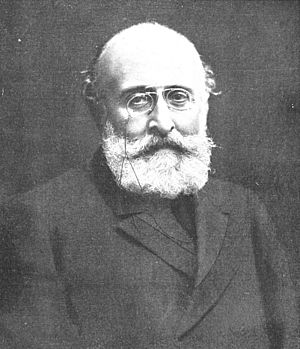Francisco Silvela facts for kids
Quick facts for kids
The Most Excellent
Francisco Silvela
|
|
|---|---|

Photograph by Kaulak
|
|
| Prime Minister of Spain | |
| In office 6 December 1902 – 20 July 1903 |
|
| Monarch | Alfonso XIII |
| Preceded by | Práxedes Sagasta |
| Succeeded by | Raimundo Fernández-Villaverde |
| Seat K of the Real Academia Española | |
| In office 30 April 1893 – 29 May 1905 |
|
| Preceded by | Mariano Roca de Togores |
| Succeeded by | Cristóbal Pérez Pastor |
| Personal details | |
| Born |
Francisco Silvela y Vielleuze
15 December 1843 Madrid, Spain |
| Died | 29 May 1905 (aged 61) Madrid, Spain |
| Signature | |
Francisco Silvela y Le Vielleuze was an important Spanish politician. He was born in Madrid, Spain, on December 15, 1843. He later became the Prime Minister of Spain, which is like the head of the government.
Silvela served as Prime Minister two times. His first term was from May 3, 1899, to October 22, 1900. His second term was from December 6, 1902, to July 20, 1903. He was a member of the Conservative Party.
Contents
Who Was Francisco Silvela?
Francisco Silvela was a key figure in Spanish politics during the late 1800s and early 1900s. He was known for his leadership within the Conservative Party. This party aimed to keep traditional values and a strong government in Spain.
Leading Spain: Prime Minister Silvela
Silvela became the leader of the Conservative Party after its previous leader, Antonio Cánovas del Castillo, passed away in 1897. This made him a very important person in Spanish politics.
Key Decisions and Challenges
During his time as Prime Minister, Silvela made several important decisions. One notable event was the signing of the German–Spanish Treaty (1899). This treaty involved Spain selling its remaining islands in the Pacific Ocean to Germany. These islands were part of what was known as the Spanish East Indies. This decision changed Spain's global presence.
In 1900, Silvela chose General Arsenio Linares y Pombo to be the Minister of War. General Linares had experience from the Spanish–American War.
Later Life and Legacy
Francisco Silvela decided to step away from politics in 1903. He chose Antonio Maura to take over as the new leader of his party. Silvela passed away in Madrid on May 29, 1905.
Besides his political career, Silvela was also a member of the Real Academia Española. This is a very important institution that looks after the Spanish language. He joined the Academy on April 30, 1893.
Family Life
Francisco Silvela was married to Amelia Loring Heredia. They had two children named Jorge and Tomas.
See also
 In Spanish: Francisco Silvela para niños
In Spanish: Francisco Silvela para niños
 | Percy Lavon Julian |
 | Katherine Johnson |
 | George Washington Carver |
 | Annie Easley |

